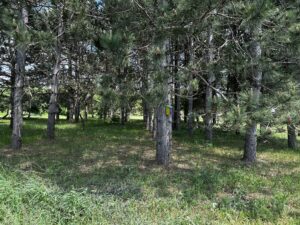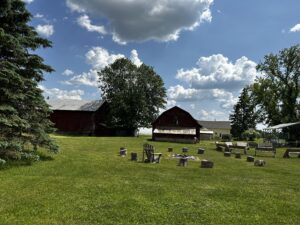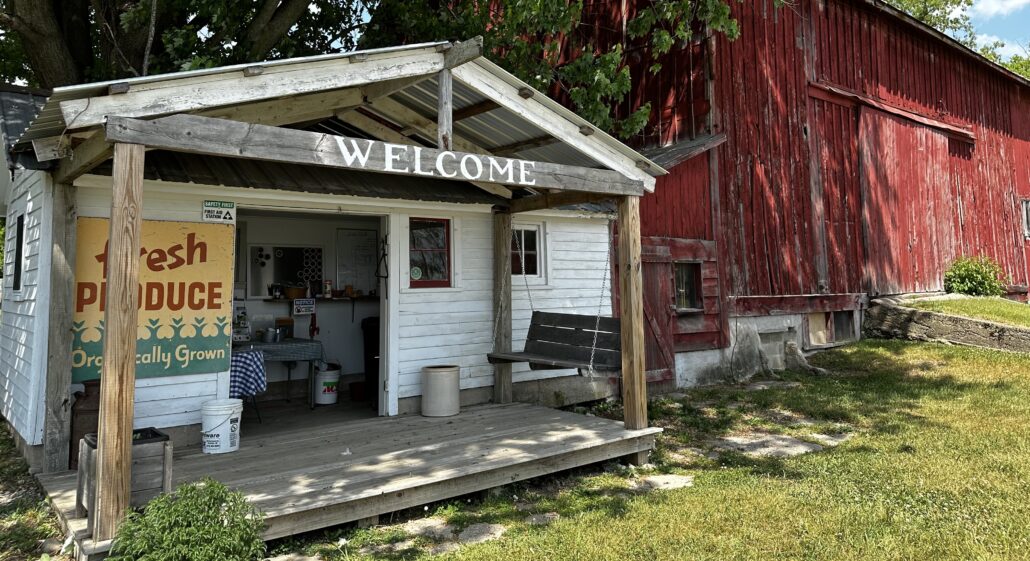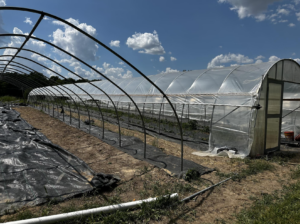By: Lindsey Schmidt, Eco-Journalism and Blogging Intern
Along with WMEAC, there are many other outstanding farms and organizations in the Grand Rapids area whose goal is to positively impact the environment, including Plainsong Farm. Located in Rockford, MI, this farm was co-founded by Nurya Parish, Mike Edwardson, and Bethany Edwardson in 2015. I had the opportunity to chat with Nurya about the farm’s mission, techniques, and programs and evaluate what it means to cultivate connections between people and the earth.
In addition to being the executive director of Plainsong Farm, Reverend Nurya Parish holds a Master’s Degree in Divinity from Harvard Divinity School and is the author of Resurrection Matters: Church Renewal for Creation’s Sake. When asked about her motivation for co-founding the farm, she said that from an early age, she started to notice that the systems we rely upon as humans are not sustainable. This realization came with a few questions: Why do we continue to rely upon these systems if they are not conducive to life in the long run? What gives humans the right to take charge of the rest of the earth? Eventually, her questions brought her to religion, and she realized that her purpose was to create a space in which people are able to ask these sorts of questions and work together to find answers.
Plainsong Farm combines the teachings of the Christian faith with agricultural practices, with their mission being to “cultivate connections between people, places, and God.” The farm is described by its employees as a “living laboratory.” When asked what that means, Nurya said that from her perspective, being a “living laboratory” means “noticing the ways that our lives are one and experimenting toward understanding our place in Creation more fully and caring for the earth more wisely.” In other words, a crucial pillar of Plainsong Farm’s existence and mission is acknowledging when we might not be caring for the earth as wisely as we could be and proposing new techniques that we might be able to use in order to live in harmony with the earth.

Along with being a “living laboratory,” Plainsong Farm utilizes regenerative farming techniques. Working in collaboration with organizations such as New City Neighbors, Kent Conservation District, and the Lower Grand River Organization of Watersheds, Plainsong Farm has cultivated a space in which they farm for the health of the soil and all of the diverse species of the region. They have done this by evaluating their land and deciding which areas are suitable for agriculture, utilizing cover crops and creating pollinator habitats, planting native trees and bushes, doing what they can to eradicate invasive species, and building bird and bat houses. Additionally, they “seek the wisdom of the people and communities that have loved this place before [them], including the Great Lakes Anishinabek.” Nurya and her colleagues make an effort to learn about the history of Indigenous peoples of the area and how that story intersects with the history of the Episcopal Church. Nurya says that taking this journey has allowed Plainsong Farm to rethink how they understand their place here and how they can learn from Indigenous ways of eating and caring for the earth: “This is a place where we want to not only ask questions but also experiment toward wiser practices and try to create relationships that will be generative across tribes and communities.”
Plainsong Farm uses the “living laboratory” mindset and regenerative farming techniques in order to harvest an abundance of crops, all of which are donated to individuals and families who are coping with poverty. As a nonprofit organization with funding from donors, the minds behind Plainsong Farm realized that they were in a unique position to be able to donate all of the crops that they produce. In partnership with their collaborators, New City Neighbors, Plainsong Farm is able to harvest and donate thousands of servings of fresh produce each year. Their goal for 2023 is to donate 30,000 servings of fresh produce to those who wouldn’t otherwise be able to afford produce at market price.
In addition to donating all of the produce that they harvest, Plainsong Farm contributes to the community via all of the opportunities that they have to offer. The farm hosts about four young adults each year for their fellowship program called “Year of Service and Learning.” During this 10-month period, fellows live on the farm while they work with Plainsong Farm staff and attend formation hours, during which fellows receive spiritual guidance and discuss what they can learn from the Christian tradition. Fellows are encouraged to come with questions; the experience is designed to be a safe space for young adults to explore their spirituality. There are four fellowship positions: the Farm Crew Fellow, the Care of Place Fellow, the Hospitality and Education Fellow, and the Storytelling Fellow. Fellows have a variety of responsibilities, ranging from contributing to the farm’s agricultural development to making the farm hospitable to visitors and assisting with the many other opportunities that Plainsong Farm has to offer.
 Plainsong Farm also has events that cater toward youth and families, including experiential programs such as “Growing With Sprouts” and “Families on the Farm.” The goal of these activities is to provide children with experiences outdoors and away from screens so that they may find joy in Creation, discover who they are, and cultivate empathy for the rest of the world. During these events, children and families can be seen singing, gardening, and crafting. Another popular event for people of all ages is “Sabbath at the Farm,” which is held weekly on Sundays between Memorial Day and Labor Day. Each “Sabbath at the Farm” event includes a wandering question which is used to guide discussion of a particular section of scripture. After an experiential activity, discussion, and singing, all attendees share a meal. Through events like these, Plainsong Farm is able to effectively cultivate connections between people, places, and God.
Plainsong Farm also has events that cater toward youth and families, including experiential programs such as “Growing With Sprouts” and “Families on the Farm.” The goal of these activities is to provide children with experiences outdoors and away from screens so that they may find joy in Creation, discover who they are, and cultivate empathy for the rest of the world. During these events, children and families can be seen singing, gardening, and crafting. Another popular event for people of all ages is “Sabbath at the Farm,” which is held weekly on Sundays between Memorial Day and Labor Day. Each “Sabbath at the Farm” event includes a wandering question which is used to guide discussion of a particular section of scripture. After an experiential activity, discussion, and singing, all attendees share a meal. Through events like these, Plainsong Farm is able to effectively cultivate connections between people, places, and God.
Nurya expressed during our interview that when she was co-founding this farm, there wasn’t a lot of assistance available to her. One of her goals is to change that so, hopefully, more farms like this start cropping up all over the United States. Plainsong Farm offers the opportunity for other like-minded individuals to get advice from Nurya and the rest of the staff via the Ministry Innovators Cohort. Joining this cohort allows other individuals or groups to receive assistance when it comes to founding spaces where the goal is to use Christian traditions to live in harmony with the earth. Additionally, Nurya acknowledges that oftentimes, lands that are under the jurisdiction of religious organizations are not utilized in such a way that promotes biodiversity. For the past several years, Nurya has been working on helping religious leaders understand that land is an asset for ministry and she has been advocating for that land to be used in constructive ways that contribute to our ecology.
The welcoming atmosphere of Plainsong Farm makes it a wonderful place for people of all ages to learn about how they can utilize our land to live in harmony with the earth while abiding by Christian traditions. If you are interested in checking it out, head over to their website and sign up for one of the many opportunities they have to offer for individuals, families, and groups. It is bound to be a valuable and worthwhile experience!



